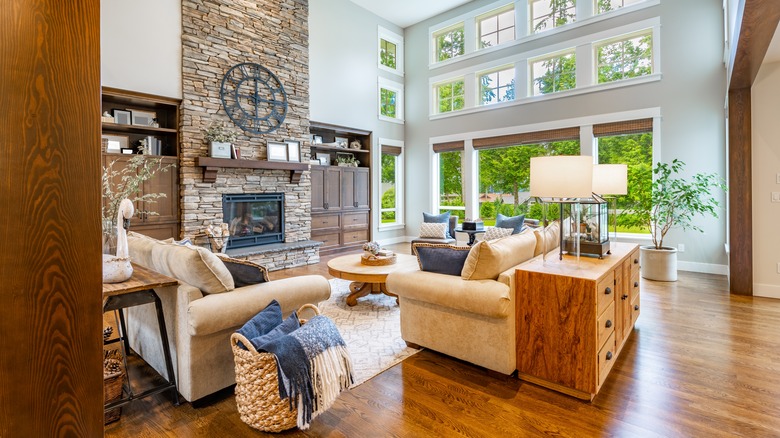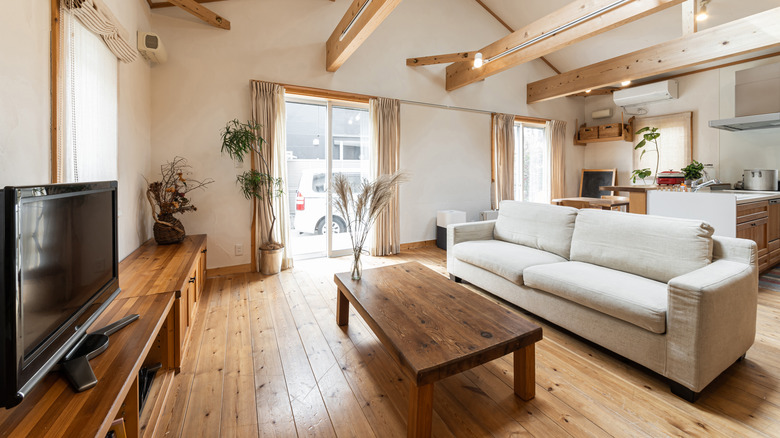Home Town's Ben & Erin Napier Show Us A Seamless Way To Mix Woods In Your Space
Wood adds warmth and charm to any room. But trends in wood finishes frequently change, and once fashionable furniture may soon look dated. If you're hesitant to commit to a single finish for your wood furniture or flooring, you'll be happy to hear that it's perfectly acceptable to mix and match. As "Home Town" stars Ben and Erin Napier demonstrated in the Season 7 episode "Wood, Brick, and Clay," the days of matchy-matchy bedroom and living room sets are officially over.
After discovering their client's fondness for natural woods, Ben and Erin decide to incorporate multiple wood features throughout the home's main rooms. Inspired by the original brick floors, they select several wood types with different tones, colors, and grain patterns — mahogany front doors, walnut-stained oak floors, yellow pine countertops, knotty unfinished ceiling beams, and deep black cabinets with green undertones. Despite the clashing combination, they seamlessly blend the different woods to create a beautiful and personalized living space the homeowner adores.
Combining so many wood tones and colors may seem daunting, especially if you're accustomed to buying monotone matching sets from furniture stores. But following one fundamental rule can help you perfectly mix wood tones to create a seamless look. If you're feeling daring, however, you can take a page from the Napiers and throw the rule book out the window.
The fundamental rule for mixing woods to create a seamless look
Seamlessly mixing woods requires some understanding of tones and undertones. Tone (or mass tone) refers to the overall color of a piece of wood, like ebony, honey maple, or chocolate brown. This is the color you see at first glance. Before mixing woods, you'll need to choose a dominant tone for your space. Often, this tone is the color of your wood floor, but it could also be the color of a conspicuous piece of wood furniture such as a large dining table or kitchen cabinets. You can use this dominant tone as a base to mix and match other wood tones.
As the name implies, an undertone is a more subtle color underneath the mass tone. Undertones are categorized as either warm or cool. Woods with warm undertones have hints of yellow, red, or orange — think cherry, hickory, maple, and mahogany. In contrast, woods like ash and poplar have cool, grayish-green undertones, as do woods treated with gray, black, or espresso stains. Walnut and unstained pine are often considered neutral because they blend well with most other wood types. Although most designers encourage people to experiment with contrasting mass tones, they warn against mixing different undertones. If the undertone of your wood floor is warm, like red oak, then stick with other warm undertones such as maple or pecan.
How to break the fundamental rule for mixing woods and still create a seamless look
As Erin Napier shows viewers in the "Home Town" episode, design rules are sometimes meant to be broken. For instance, she purposefully selects black paint with green (cool) undertones for the wood cabinets as a contrast to the warm red undertones in the mahogany doors. By juxtaposing these pieces with the orange and gray colors in the home's brick floors, she seamlessly ties together the opposing undertones. Another way Erin makes multiple woods and mismatched tones feel cohesive is by ensuring that each wood is used in multiple ways throughout the house. The ceiling beams and trim around the kitchen entryway are made from unfinished wood, while both the mantel and countertop are constructed from yellow pine. The walnut-stained floors in the entryway reappear in the front rooms, and the black cabinets in the living room match those in the kitchen. This repetition creates coherence across the different spaces.
Ultimately, your wood choices come down to personal preferences. If mixing your warm mahogany dining chairs with your cool weathered gray floors creates a space where you're happy to hang out, that's all that matters. Go ahead and break the rules, you rebellious trendsetter.


